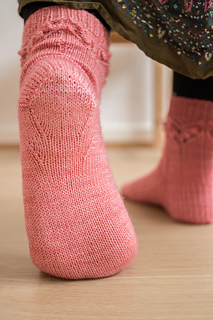patterns >  Tisserin Coquet Designs
Tisserin Coquet Designs
> Cathédrales








Cathédrales
Loving what you’re seeing? Then you’ll love this : buy 3 of my patterns, get 1 for FREE! Place 4 patterns in your cart and the least expensive one will be free! No coupon needed, everything is automagic ✨
Vous aimez ce que vous voyez ? Alors vous allez adorer ceci : achetez 3 de mes patrons, recevez-en 1 gratuitement ! Placez 4 patrons dans votre panier et le moins cher sera gratuit ! Pas besoin de coupon, tout est automatique ✨
These socks were born out of a personal experience. They were originally a holiday project for me, one where I didn’t want to think and wanted to unplug my brain. Now, the thing is that I know from memory the numbers for the flap heel knitted cuff down but not the other way around, and I completely fell for a lace and bobble motif and wanted to use it at all costs. This led to a crazy question: is it possible to use a motif worked from the bottom up in socks worked in the opposite direction?
The construction of these socks is a bit unusual. The socks are started with a provisional cast-on, and the cuff, including the lace motif, is worked from the bottom up. Once it’s done, the stitches are then picked up and the rest of the sock is worked in the other direction, from the cuff down. They feature a flap heel and rounded toes. The decreases in the gusset are located under the foot, in the middle of the sole, forming two little arrows.
Sizes: S [M, L] to fit foot circumferences of 19-21 [21-23, 23-25] cm / 7 ½-8 ¼ [8 ¼-9, 9-9⅞]”.
Finished measurements (foot circumference): 15.5 18, 20 cm / 6⅛ 7⅛, 7⅞“
Skills:
Provisional cast-on
Bobbles
Simple lace
Elastic bind-off
Gauge (10x10cm / 4x4”); knitted in the round:
• Stocking Stitch = 34 stitches x 46 rounds.
• 1x7 ribbing (unstretched) = 38 stitches x 46 rounds.
Chart A (size M); knitted in the round: 2 x 1 repeat
• 32 stitches x 22 rounds = 9.5 cm x 4.5 cm / 3¾ x 1¾”
Yarn:
260 290, 320 m / 284 317, 350 yds of fingering yarn (380 to 425 m for 100 g).
Sample socks are worked in Eline et Laine Tabi (75% merino superwash, 25% nylon – 425 m / 465 yds & 100 g per skein), col. Rose Trémière.
Circular needles or double-pointed needles, or your preferred needles to work in the round: 2,5mm / US #1.5
Notions: 2 stitch markers, 1 tapestry needle, a small length of waste yarn for the provisional cast-on
The pattern has been techedited and tested to ensure that everything is clear and as error-free as possible. However, small details can sometimes slip out of our sight and if you need pattern support, please contact us at support@tisserincoquet.fr
Ces chaussettes sont nées d’une expérience personnelle. Elles étaient à l’origine un projet de vacances pour moi, un projet où je ne voulais pas réfléchir et où je voulais débrancher mon cerveau et tricoter ce qui me passait par la tête. Or, je connais de mémoire les chiffres pour un talon à bande tricoté depuis la jambe mais pas l’inverse. Et j’ai évidemment complétement craqué pour un motif en dentelle avec des petites boules que je voulais à tout prix utiliser. D’où une question un peu folle : est-il possible d’utiliser un motif qui se tricote de bas en haut dans des chaussettes tricotées dans le sens inverse ?
La construction de ces chaussettes est ainsi un peu particulière. Les chaussettes sont commencées par un montage provisoire, et le haut du mollet, y compris le motif de la dentelle, est travaillé de bas en haut. Une fois les côtes finies etrabattues, les mailles sont reprises et le reste de la chaussette est tricoté dans l’autre sens, de la jambe vers les orteils. Elles comportent un talon à bande et des orteils arrondis. Les diminutions du gousset sont situées sous le pied, au milieu de la semelle, formant ainsi deux petites flèches.
Tailles : S [M, L] pour correspondre à une circonférence de pied de 19-21 [21-23, 23-25] cm / 7 ½-8 ¼ [8 ¼-9, 9-9 ¾]”.
Dimensions finies (tour du pied) : 15.5 18, 20 cm / 6⅛ 7⅛, 7⅞“
Techniques :
Montage provisoire
Boules
Dentelle simple
Rabattage élastique.
Échantillon (10x10cm / 4x4”); tricoté en rond:
• Jersey = 34 mailles x 46 tours
• Côtes 1x7 (non étiré) = 38 mailles x 46 tours.
Motif A (taille M); tricoté en rond: 2 x 1 répétition
• 32 mailles x 22 tours = 9.5 cm x 4.5 cm / 3¾ x 1¾”
Fils:
260 290, 320 m / 284 317, 350 yds de laine fingering (380 à 425 m pour 100g).
Le prototype est tricoté en Eline et Laine Tabi (75% mérinos superwash, 25% nylon – 425 m / 465 yds & 100 g par écheveau), col. Rose Trémière.
Aiguilles circulaires ou double-pointes ou vos aiguilles préférées pour tricoter en rond: 2,5mm / US #1,5
Divers : 2 anneaux marqueurs, 1 aiguille à tapisserie, petite longueur de laine auxiliaire pour le montage provisoire
282 projects
stashed
175 times
- First published: November 2022
- Page created: November 25, 2022
- Last updated: May 16, 2023 …
- visits in the last 24 hours
- visitors right now




